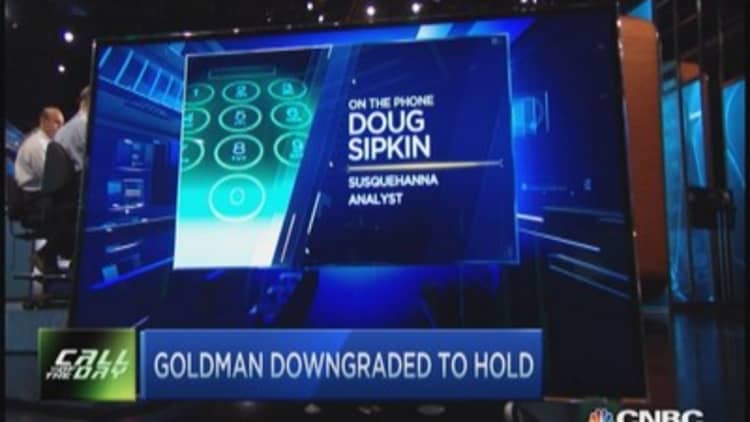The drop in high yield bonds this month could ruin the year for Goldman Sachs.
The iShares iBoxx High Yield Corporate Bond ETF (HYG) is down about 5 percent since its peak for the quarter in late October. Historically, when it falls more than5 percent, financials underperform the market, according to Kensho, a quantitative analytics tool.
Goldman Sachs had the worst return out of the major investment banks when high yield bonds crack, with a median return of negative 4.82 percent, while Citigroup had a median negative return of 4.39 percent.
The research firm Susquehanna on Wednesday gave the fundamental link to what the historical Kensho search found: The drop in the high yield market would weigh on "the debt portion of investing and lending."
Susquehanna downgraded Goldman to "neutral" from "positive."
Citing Reuters, the Susquehanna report said that energy has accounted for 22 percent of U.S. high yield issuance and 16 percent of loan issuance through December, so oil's rout was ultimately behind the crack in the high yield market.
Other analysts also don't see Goldman's year ending well. Of the 25 ratings on FactSet, only three rate the firm "buy."

Other financials that underperformed the market when junk bonds declined more than 5 percent included Bank of America, with a median return of negative 0.22 percent, and JPMorgan Chase, with a median return of 0.32 percent.
The top two outperforming financials during that time were BlackRock and Morgan Stanley, which had median returns of about 7 percent.
Chris Kimble of Kimble Charting Solutions has tracked a decline for all the financials the last few times there's been a downturn in high-yield corporate bond funds.
"When they (junk bonds) turned weak in the late '90s, banks lost about a third of their value from 2000 to 2002," Kimble said. "Junk turned weak again in 2007 and banks lost about 80 percent of their value."
He pointed out that, especially in the case of the PIMCO High Yield Fund (PHDAX), the yield seems to be tracking a rise over the last five years similar to that prior to the 2007 slide.
"Now high yields could be repeating their pattern of 2007 again right now," he said. "Should junk bonds reflect further weakness, it could well impact the broad markets and financial stocks, like they have in the past."
Read MoreBig banks will always be most dangerous: Pro
The study looked at seven instances when HYG fell more than 5 percent in the last five years during one month.
CNBC's parent NBCUniversal is a minority investor in Kensho.


